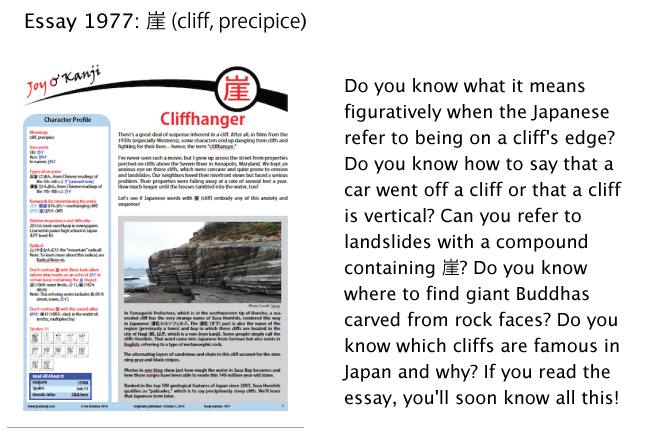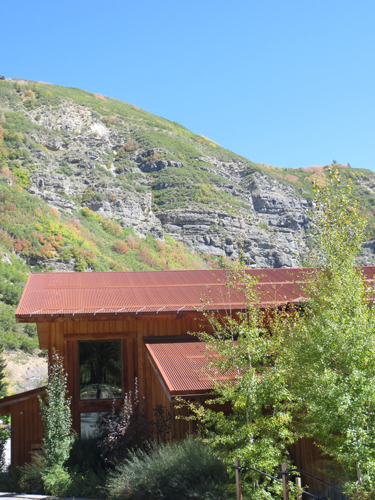Getting Underfoot
What do you think the following phrase might mean?
しっかりと足元を見つめる
しっかり (firmly); 足元 (あしもと: underfoot);
見つめる (みつめる: to look at intently)
Here are your choices:
a. staring at one's feet pointlessly (i.e., navel gazing)
b. having a steely focus and a firm grip on the ground (and on reality)
c. The answer you seek is right there at your feet.
d. Tread lightly and look before you leap.
I'll block the answer with some scenery from my recent road trip through Nevada and Utah:

It's appropriate that I saw cliff after cliff and mountain after mountain for most of the 2,000 miles we covered, as this week's essay is on 崖 (cliff, precipice). Here's a sneak preview:

In that spirit, here are more cliffs from the trip:
I haven't forgotten about the quiz at the beginning! Here's the answer:
c. The common phrase しっかりと足元をみつめる means "The answer you seek is right there at your feet."
Well? Was it?!
In the new essay, this wording appears in a sign that also features 崖 prominently.
I'm intrigued that all the parts of しっかりと足元をみつめる add up to mean what they do. The composition is poetic, I'm told, rather than something we can piece together logically.
I'm also amused to see 足元 in this serious, philosophical expression because I associate that word with the first Japanese story I read. I knew very little back then, only the kana, but the book was for young Japanese children and included no kanji. A tale about giants and dwarves (小人, こびと or "little people"!), it involved a giant who walked with heavy footsteps, referred to in the book as あしもと. The book provided sound effects for those thunderous steps: ドン, ドン, ドン!
Now that I see the kanji rendering 足元, I appreciate it in a different way. This word can mean the following:
1. at one's feet; underfoot; one's step (as in "watch your step")
2. gait; pace; step
Breen also defines 足元 as "you; thou," but that's not quite right.
It might look as though 足元 breaks down as foot + origin. However, when I type あしもと and convert it to kanji, the first option is 足下. Was this the original way of writing あしもと? It's impossible to know which version came first, says my proofreader, who adds that 足許 is one more rendering of あしもと. At any rate, it becomes clear from 足下 that the もと of あしもと means "under," rather than "origin." Ah, that makes much more sense as a representation of "under foot."
As long as I'm raising tough questions, here's another. Can you say the following rhyme without smiling?
橋本の足元
Hashimoto's footsteps
橋本 (はしもと: surname)
I can't!
According to Breen, 足元 pops up in a variety of phrases:
足元を見る (あしもとをみる: to take advantage (e.g., of a weak situation))
one's step (1st 2 kanji) + to look at
足元を掬う (あしもとをすくう: to trip someone up; pull the carpet out from under someone)
one's step (1st 2 kanji) + to scoop
足元にも及ばない (あしもとにもおよばない: to be no match for)
one's step (1st 2 kanji) + unattainable
A cruel streak runs through the world of 足元! It's hardly about just taking a stroll or figuratively following in someone's footsteps. What's going on here? Let's consider these expressions individually, starting with this one:
足元を見る (あしもとをみる: to take advantage (e.g., of a weak situation))
one's step (1st 2 kanji) + to look at
Kojien says that 足下を見る comes from the days when palanquin bearers looked at travelers’ feet to assess how exhausted the travelers were, overcharging them if they were very tired. The same source also says that the phrase came to mean “to take advantage” in general.
Next up is this phrase:
足元を掬う (あしもとをすくう: to trip someone up; pull the carpet out from under someone)
one's step (1st 2 kanji) + to scoop
My proofreader says that this does not appear to be an officially accepted idiom. Instead, the proper expression is 足をすくう (あしをすくう: to trip someone up), which refers to the act of "scooping up" a person's foot. For instance, there's a wrestling or judo move in which one scoops up the opponent's foot and then topples the person. Somehow the Japanese have extended this usage to 足元を掬う and to 足下をすくう. Although Daijisen labels 足下をすくう as wrong, that source also mentions that people now use this phrase more often than the original 足をすくう.
Finally, we come to this expression:
足元にも及ばない (あしもとにもおよばない: to be no match for)
one's step (1st 2 kanji) + unattainable
This literally means “not to be even as good as being under someone's feet,” which is to say “to be nowhere near as good as somebody else."
That's good enough for me! Have a great weekend! And watch your step, particularly if you're near the edge of a cliff!








Comments